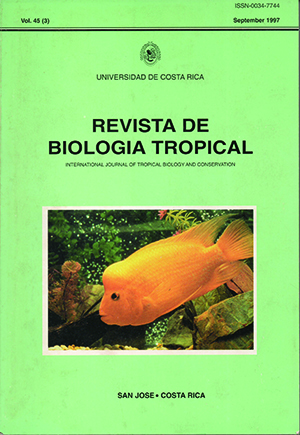Abstract
At Vicosa (Minas Gerais, Brazil) the longevity and fecundity of female Podisus nigrispinus (Dalias)
(Heteroptera: Pentatomidae) were studied underlaboratory conditions (24 ± 3 oC, RH of 70 ± 10% and photophase
of .12 hours). They were fed for 24 hours each time at one, two, four, eight or 16 day in.tervals with Musca
domestica L. (Diptera: Muscidae) larvae and a continuous supply of beans (Phaseolus vulgaris L.). Reproduction
and survival were significantly affected by feeding intervals. Total number of eggs was similar foi females fed
every one (167.9 ± 123.0 eggs), two (143.1 ± 61.2 eggs) and four days (67.9 ± 17.9 eggs) with reduced number and
no eggs recorded for females fed every eight (9.0 ± 10.5 eggs) and 16 days respectively. Longer longevities were
recorded for females fed every two (27.2 ± 2.9) and four (28.6 ± 8.9) days than Cor those fed every 16 days (11.7
± 1.3).
##plugins.facebook.comentarios##

This work is licensed under a Creative Commons Attribution 4.0 International License.
Copyright (c) 1997 Revista de Biología Tropical


